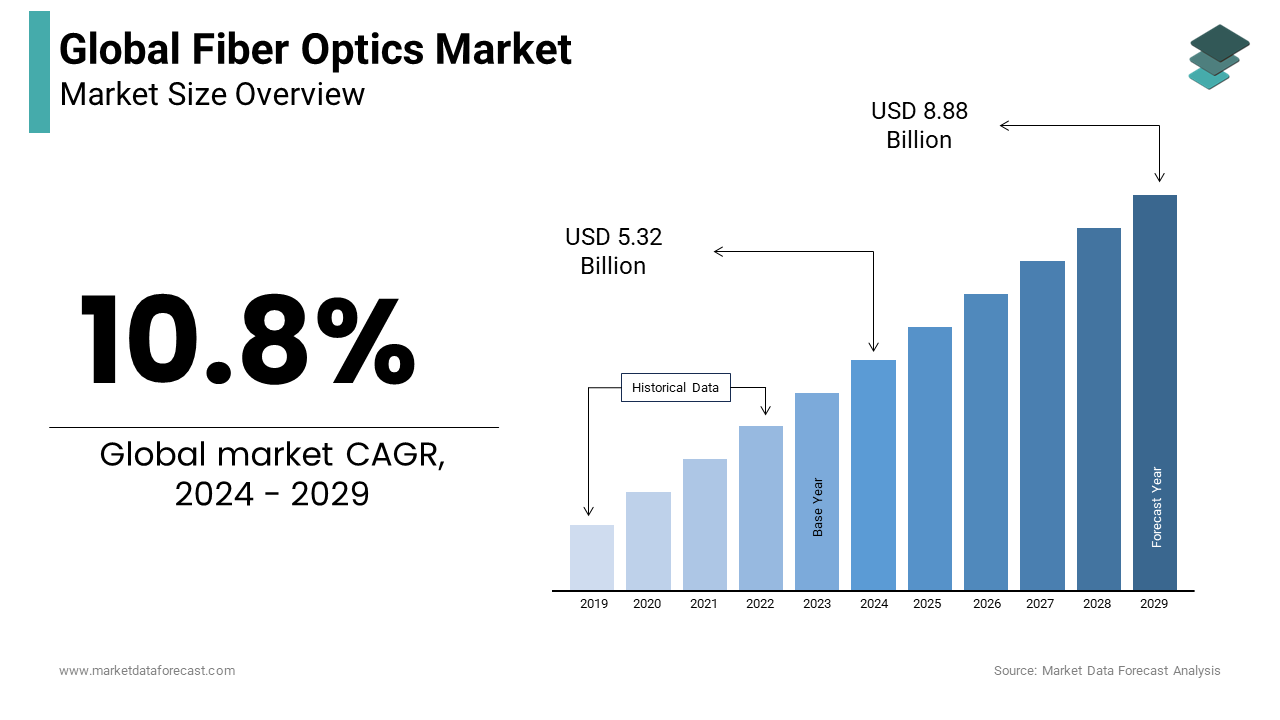Global Fiber Optics Market Size, Share, Trends, & Growth Forecast Report – Segmented by Cable Type (Single mode and Multi-mode), Optical Fiber Type (Glass and Plastics), Application (Telecom, Premises, Utility, CATV, Military, Industrial, Sensors, Fiber Optic Lighting, Security, Metropolitan) and Regional - (2024 to 2032)
Global Fiber Optics Market Size (2024 to 2032)
The global fiber optics market was worth USD 4.80 billion in 2023. The global market is estimated to reach USD 5.32 billion in 2024 and USD 12.08 billion by 2032, growing at a CAGR of 10.8% during the forecast period.

An optical fiber is a transparent and flexible fiber made by drawing glass or plastic, which is used to transmit light. Optical fiber has many uses in fiber-optic communications, where it allows transmission over longer distances and in higher bandwidths than cables. Fiber optic cable includes glass or plastic cables capable of transferring data at high speeds. Telecom companies and consumers prefer it because of the large capacity of its data volume. The lightweight nature of these cables and their low sensitivity to noise and interference make them a highly prized product.
REPORT COVERAGE
|
REPORT METRIC |
DETAILS |
|
Market Size Available |
2023 to 2032 |
|
Base Year |
2023 |
|
Forecast Period |
2024 to 2032 |
|
CAGR |
10.8% |
|
Segments Covered |
By Type, Application, And Region |
|
Various Analyses Covered |
Global, Regional & Country Level Analysis, Segment-Level Analysis, DROC, PESTLE Analysis, Porter’s Five Forces Analysis, Competitive Landscape, Analyst Overview on Investment Opportunities |
|
Regions Covered |
North America, Europe, APAC, Latin America, Middle East & Africa |
|
Market Leaders Profiled |
Corning Incorporated, Optical Cable Corporation (OCC), Sterlite Technologies Limited, OFS Fitel LLC, Prysmian Group, AFL, Birla Furukawa Fiber Optics Limited, Finolex Cables Limited, and Yangtze Optical Fiber, Cable Co., Ltd. (YOFC), and others. |
SEGMENTAL ANALYSIS
Global Fiber Optics Market Analysis By Type
Single-mode optical fiber networks use wave division multiplexing (WDM) to transfer and increase the data traffic that will be sent between the filaments. Multimode cables use WDM to transfer data at different speeds to certain types of clients.
Global Fiber Optics Market Analysis By Application
All mentioned applications require fiber-optic cables to take advantage of high-speed Internet bandwidth.
KEY PARTICIPANTS IN THE GLOBAL FIBER OPTICS MARKET
The major companies operating in the global fiber optics market include Corning Incorporated, Optical Cable Corporation (OCC), Sterlite Technologies Limited, OFS Fitel LLC, Prysmian Group, AFL, Birla Furukawa Fiber Optics Limited, Finolex Cables Limited, and Yangtze Optical Fiber and Cable Co., Ltd. (YOFC).
RECENT HAPPENINGS IN THE GLOBAL FIBER OPTICS MARKET
-
In August 2016, Sumitomo Electric Industries (SEI) launched a new ultra-high fiber counting series to meet the demand for data centers.
-
In June 2016, Corning Inc. acquired Alliance Fiber Optic Products Inc. (US) to grow its data center and FTTH applications further.
-
In January 2019, Leoni and Hengtong established a joint venture for single-mode fiber manufacturing in Europe. The expansion of broadband in Germany and other European countries and the growing demand for data centers require high-performance single-mode fibers as a key element of optical cables. Leoni and Hengtong are joining forces to meet this increasing demand.
DETAILED SEGMENTATION OF THE GLOBAL FIBER OPTICS MARKET INCLUDED IN THIS REPORT
This research report on the global fiber optics market has been segmented and sub-segmented based on the type, application, and region.
By Type
-
Single Mode
-
Multi-Mode
By Application
-
Telecom
-
Premises
-
Utility
-
CATV
-
Military
-
Industrial
-
Sensors
-
Fiber Optic Lighting
-
Security
-
Metropolitan
By Region
-
North America
-
The United States
-
Canada
-
Rest of North America
-
-
Europe
-
The United Kingdom
-
Spain
-
Germany
-
Italy
-
France
-
Rest of Europe
-
-
The Asia Pacific
-
India
-
Japan
-
China
-
Australia
-
Singapore
-
Malaysia
-
South Korea
-
New Zealand
-
Southeast Asia
-
-
Latin America
-
Brazil
-
Argentina
-
Mexico
-
Rest of LATAM
-
-
The Middle East and Africa
-
Saudi Arabia
-
UAE
-
Lebanon
-
Jordan
-
Cyprus
-
Frequently Asked Questions
What are the primary applications driving the growth of the fiber optics market?
The primary applications fueling the growth of the fiber optics market include telecommunications, data centers, healthcare, defense, and industrial sectors.
What technological advancements are shaping the future of the fiber optics industry?
Technological advancements such as the development of bend-insensitive fibers, increased bandwidth capacity, and the emergence of integrated photonics are shaping the future of the fiber optics industry, enabling higher data transmission rates and improved performance.
What are the major challenges faced by the fiber optics industry?
Major challenges faced by the fiber optics industry include high initial investment costs, infrastructure deployment challenges, and competition from alternative technologies such as wireless communication systems.
How are advancements in 5G technology influencing the fiber optics market?
Advancements in 5G technology are driving the demand for fiber optics infrastructure to support higher data speeds, lower latency, and increased network capacity required for 5G deployment, particularly in urban areas and densely populated regions.
Related Reports
Access the study in MULTIPLE FORMATS
Purchase options starting from $ 2500
Didn’t find what you’re looking for?
TALK TO OUR ANALYST TEAM
Need something within your budget?
NO WORRIES! WE GOT YOU COVERED!
Call us on: +1 888 702 9696 (U.S Toll Free)
Write to us: [email protected]